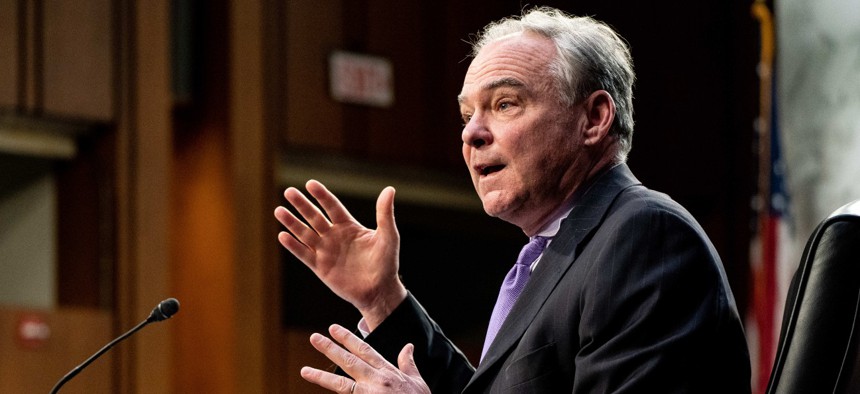
Sen. Tim Kaine, D-Va., said: “I’m introducing legislation to protect the merit-based federal hiring system and help ensure our federal workers are hired based on their qualifications, not their politics.” Anna Moneymaker-Pool/Getty Images
Lawmakers Are Doubling Down on the Effort to Prevent the Next Schedule F
The latest legislative proposal to block presidents from unilaterally stripping federal workers of their civil service protections creates additional barriers to reclassifying employees.
This story was updated at 4 p.m. to include additional information about the House version of the bill and additional reaction.
Lawmakers in the House and Senate on Tuesday introduced a new proposal in their quest to ensure that future presidents cannot recreate the Republican-led effort to strip tens of thousands of career federal employees of their civil service protections.
In October 2020, then-President Trump signed an executive order establishing a new job classification in the excepted service called Schedule F and tasked agencies with finding career employees in policy-related positions and transferring them into the new job schedule, stripping them of the vast majority of their civil service protections and making it much easier to hire and fire them. Although a few agencies were poised to implement the edict—with the Office of Management and Budget receiving approval to reclassify two-thirds of its workforce—by January 2021, President Biden quickly rescinded the order before any employees could be reclassified.
The Saving the Civil Service Act, sponsored by Sen. Tim Kaine, D-Va., and 14 other Senate Democrats, bars the president from creating any new job classifications within the excepted service aside from the five that existed in September 2020, effectively ensuring that only Congress can create new job schedules via legislation. On the House side, the bill is sponsored by Reps. Gerry Connolly, D-Va., Brian Fitzpatrick, R-Pa., and Abigail Spanberger, D-Va.
Unlike previous iterations of the bill, it also creates a series of new restrictions on how jobs may be reclassified within the confines of the current system.
First, “occupied positions”—jobs currently held by a federal employee—could not be reclassified from the competitive service, or from other schedules in the excepted service, into Schedule C, the federal government's main cadre of political appointees, without prior approval of the director of the Office of Personnel Management. Additionally, federal agencies would be limited to reclassifying 1% of their workforces or five employees, whichever is more, from the competitive service or across excepted service job schedules over the course of a four-year presidential term. And agencies would need to obtain the consent of federal employees occupying a position before they could reclassify it to another job schedule.
Although Trump’s efforts to move large chunks of the federal workforce into essentially at-will employment were ultimately not successful, interest in preventing similar schemes in the future was revived last year, after reports revealed that former White House staffers have continued to work on Schedule F since Trump left office. Conservative activists are prepared to bring back the initiative immediately upon the election of a Republican president, and they have identified 50,000 federal workers to target upon its implementation and threaten with firing.
The House on two occasions passed legislation blocking those plans, and although Kaine led efforts in the Senate to include that bill in either the omnibus spending package or the annual defense policy bill, he could not secure a floor vote for the measure.
“Our dedicated federal workers help keep our government running, protect our national security, and provide essential services to Americans like administering Social Security benefits,” Kaine said in a statement Tuesday. “I’m introducing legislation to protect the merit-based federal hiring system and help ensure our federal workers are hired based on their qualifications, not their politics.”
The bill has the support of federal employee unions and organizations representing federal managers and executives alike.
“This legislation would finally slam the door shut on one of the last administration’s worst ideas, which was to unilaterally declare untold thousands of existing career civil servants to be at-will political appointees,” said Everett Kelley, national president of the American Federation of Government Employees. “The bill would wisely make it illegal for any president to try that in the future and deserves swift passage.”
“Under current law, any president can seize control over the nonpartisan career workforce, and through this control, manipulate the equal and apolitical delivery of government services to promote their own ends,” said Senior Executives Association Board Chairman Marcus Hill. “Any president could revert thousands of federal positions back to the spoils system the American people rejected over 130 years ago.”
Good government groups like the American Society for Public Administration are also urging the bill’s enactment.
“The dedicated professionals protected under the Saving the Civil Service Act are subject matter experts with a long history of serving our nation,” said William Shields Jr., the group’s executive director and CEO. “They are the linchpin to making our government and public programs operate effectively, efficiently and equitably. And they are the institutional backbone to maintaining consistency in administering these programs across administrations, amidst changing cultural trends and so often in the face of partisanship and unnecessary attack.”







